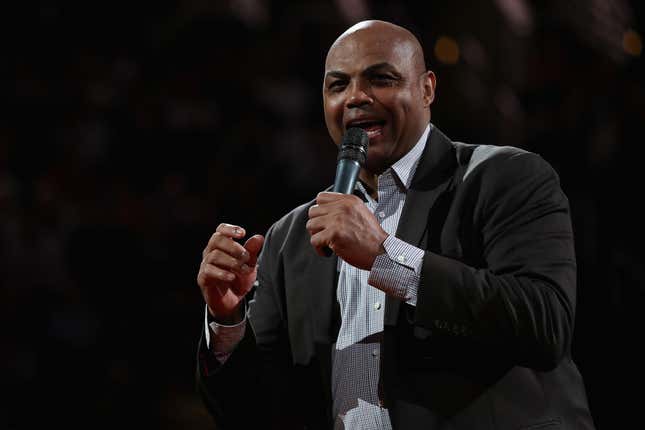
As someone who is fortunate enough to express his opinion for a living, one of my favorite phrases is “Words mean things.”
We see this all the time in politics or with terms of endearment, but this absolutely applies to the workplace, too. Case in point, even if they pay the same salary, would you rather have “manager” on your resume or “director”?
See? Words mean things.
To that end, Hall of Famer Charles Barkley might not be the most astute individual when it comes to addressing race relations in this country, but every once in a while he says something that’s remarkably spot-on.
Over the weekend, both Orlando Magic coach Steve Clifford and Portland Trail Blazers coach Terry Stotts were told, “You ain’t gotta go home, but you gotta get the hell up out of here” by their respective franchises. In Clifford’s case, the Magic arguably overachieved with a pair of postseason berths in recent years despite a lackluster roster, and in Portland, the Trail Blazers made the playoffs eight times during Stotts’ nine-year tenure, but never really came remotely close to accomplishing jack shit once they got there.
What’s interesting about each of their “separations” from their respective teams is that neither was “fired.” In fact, they both supposedly left on their own accord under the nebulous umbrella of a “mutual decision”—even though Neil Olshey, Portland’s President of Basketball Operations, dragged Stotts on his way out the door.
Here are a few gems Olshey dropped during his press conference on Monday announcing Stotts departure:
“We just felt like we plateaued.”
“In this instance […] the first-round loss, the defense was not a product of the roster.” (The Trail Blazers finished the season ranked 29th in defensive rating.)
“For anyone (prospective coaches) to advance in the process they’re going to have to prove they can do that (improve defensively) without a ton of roster changes.”
“We’ve benefitted from the offense I’ve cultured, but we’ve been hit on the defensive side of the culture.”
Shots fucking fired. Words mean things, remember?
Does this sound like Stotts dismissal was a “mutual decision”?
So when this topic was brought up during TNT’s Inside the NBA over the weekend, Barkley had the perfect response.
“Mutual parting of ways in Portland and in Orlando,” host Ernie Johnson began. “Steve Clifford out with the Magic, Terry Stotts out with the Portland Trail Blazers.”
“America, that means they were white,” Barkley interrupted. “They fire brothers; they don’t part ways.”
Barkley’s dig was obviously said in jest, but that doesn’t mean there isn’t some degree of truth to it.
Yes, Doc Rivers and the Los Angeles Temecula Clippers mutually agreed to part ways after he helped orchestrate their demise during the 2020 NBA Playoffs, but that was more of an outlier than the norm when it comes to Black coaching dismissals.
Former Knicks coach David Fizdale, New Orleans’ Alvin Gentry, Atlanta’s Lloyd Pierce, and Indiana’s Nate McMillian (who oddly enough has propelled the Hawks to new heights since replacing Pierce on an interim basis) are all recent examples of Black coaches who were denied the dignity of a “mutual decision.” Hell, Ty Lue was fired by the Cleveland Cavaliers just six games into the 2018-19 season after leading the team to three straight NBA Finals appearances and their first-ever NBA title in 2016.
“I don’t think it should’ve happened,” Lue told The Athletic in 2020. “When it happened […] it puts everything in perspective. You’ve got to continue to keep working, it’s a business—you’ve got to understand that. It was tough. To win the first championship ever in Cleveland history, and then make the Finals (the next two years) and then get fired six games in, it’s hard to swallow and it’s tough to deal with.”
And for those who argue that tenure and/or body of work factors into whether a “mutual decision” even takes place, I’m inclined to agree. Rivers was universally adored and led the Clippers for eight seasons, but how often do Black coaches even get to lead a team for that long? More often than not, they’re handed the keys to a reclamation project and are given a short leash to turn things around.
Clifford was afforded the grace of a “mutual decision” despite only three years of service to the Magic—during which he accrued a coaching record of 96-131—and the only other time I can think of a Black coach doing something comparable was when Gentry “mutually agreed” to leave the Suns in 2013—and his coaching record was 158-144.
And for those who wonder if the same thing occurs in other sports, never forget that the departure of one of the worst head coaches in NFL history, Adam Gase, was framed as “parting ways” when he “left” the New York Jets in January, while the Chargers’ Anthony Lynn was fired after going 33-31 during his four-year tenure in Los Angeles.
Again, words mean things, and while I sure as hell rarely agree with Charles Barkley, even in jest, he’s on to something with this one.

